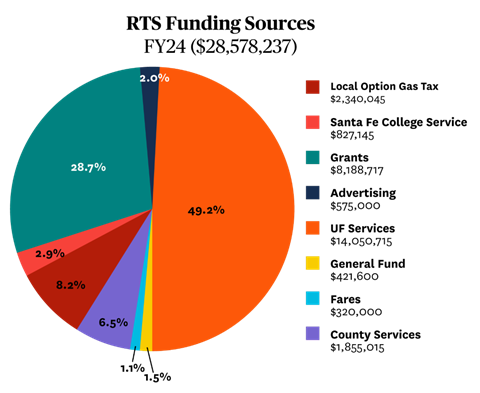UF proposes cutting $6.9M from RTS prepaid bus fare program
Published on April 09, 2024

The University of Florida (UF) has announced plans to dramatically scale back a prepaid bus fare program that comprises half of the City of Gainesville’s Regional Transit System (RTS) budget. The program, introduced in 1998, provides annual funding to RTS in exchange for unlimited bus service for students, faculty and staff.
A news conference has been scheduled today and will be livestreamed on the City’s main Facebook page.
When: 11 a.m. Tuesday, April 9
Where: Regional Transit System (RTS) Administration Building, 34 SE 13th Road
Over the past 26 years, approximately 70 percent of RTS riders have been participants in the UF program.
“Since 1998, this partnership has been woven into the life of our community,” said Gainesville Mayor Harvey Ward. “It is a shining example of a strong, working town-gown collaboration. It’s good for the environment, it reduces traffic congestion and it has become an integral part of the way UF students come to learn about and love the City of Gainesville.”
Beginning July 1, 2024, that arrangement may change. Citing cost as a factor and calling the current system “no longer substantiable,” a new UF proposal would end the traditional contract that in fiscal year 2024 is budgeted to account for $13.7 million in bus revenue and replace it with an agreement to make monthly payments. Those installments of $570,000 would be paid by the university going forward until a long-term solution is reached.
This approach represents a substantial lessening of university support for public transit in Gainesville. The monthly payment proposal would lower UF’s total annual financial contribution to RTS from this year’s budgeted $13.7 million to $6.8 million, a drop of 50 percent. To compensate, RTS would be forced to eliminate a number of buses and routes which, in turn, would bring about a corresponding decrease in the number of students riding the buses — an outcome that opens the door to additional financial repercussions.
Ridership volume associated with the UF partnership is necessary for the state and federal funding and matching grants that support transit-related projects across our community. A significantly lower number of riders would impact future grant opportunities. It is not yet clear how it might jeopardize current projects.
“If this change goes through, its ripple effects will be felt throughout our community for years to come,” said Gainesville Transportation Director Jesus Gomez. “RTS would take buses off the road. Without the UF riders and grant funding, there would be no choice but to cut routes. For people who take the bus to work or class—or the doctor or grocery store—that’s a major life change.”
The pie graph showing sources of RTS revenue for fiscal year 2024 clearly demonstrates the significance of the City-UF partnership.
Funding from the university, which is primarily associated with the prepaid bus fare program, represents 49.2 percent of total RTS revenue.
Another 28.7 percent of combined funding, which comes from the Federal Transit Administration (FTA) and the Florida Department of Transportation (FDOT), is in the form of grants connected to ridership volume. Together, FTA, FDOT and UF make up 77 percent of the revenue that keeps RTS operational across the Gainesville Urbanized Area.
City leaders, who have been requesting information related to the new UF proposal since last fall, are now reviewing the details and remain hopeful that rather than upending the partnership that has long been a source of stability and connection between UF and the City of Gainesville, this plan will be revised and a compromise will be reached.
“Everyone in this discussion is part of the same community,” said Mayor Ward. “University of Florida staff, students and faculty are part of Gainesville. So are the people whose jobs and businesses rely on the university, and so are the neighbors who ride the bus to work and the people who use RTS to get to UF Health hospitals and clinics for treatment or preventive care. We’re all in this together and I’m confident we’ll find a solution.”